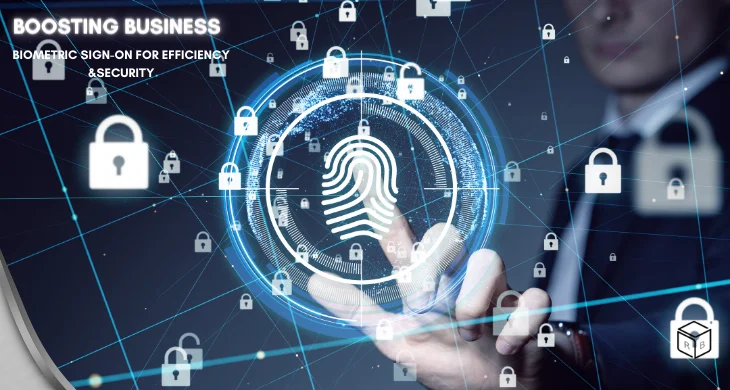In the present era, safeguarding data security and ensuring privacy have become critical priorities for all types of organizations and businesses. Several key aspects demand a robust authentication system, including data security, customer identification, personnel tracking, and access control. Conventional methods like passwords, access cards, and PIN systems have proven insufficient to address the increasingly complex security challenges we face today. As a result, biometric authentication has emerged as a trustworthy and indispensable method for fostering business development and ensuring a high level of security.
Statistics indicate a growing need for biometric authentication in various industries. According to Vanson Broune’s research, around 14.89% of decision-makers in the financial services sector consider passwordless authentication crucial for achieving optimal security levels. Moreover, the average annual cost of a data breach stands at approximately $2.19 million.On the customer front, a significant 74% of consumers believe that physical biometrics offer the highest level of security for digital identity verification. In light of these findings, this article will explore the diverse applications of biometric authentication and highlight its advantages for organizations.
Why is Biometric Authentication the Future of Business?
Biometric authentication presents numerous advantages when compared to conventional methods like passwords or PINs. One notable benefit is the elimination of the need to remember complex passwords or carry physical tokens, resulting in a faster and more convenient authentication process. Additionally, biometric authentication significantly enhances security as the verification is based on unique and individual traits that are extremely difficult to hack or replicate.
By incorporating biometric authentication, businesses can streamline their operations and witness notable improvements in both employee productivity and customer service. This technology eradicates the necessity for frequent password resets and minimizes the risk of password sharing among employees. As a result, biometrics contribute to the overall ease of conducting business and elevate the customer experience. Let’s explore the diverse applications of biometric authentication in various business settings.
Different Ways Biometric Authentication Can Be Used in Business
Biometrics offers businesses a versatile and powerful tool to manage employee attendance and identify customers for various services. Through personalized recommendations and customized experiences, biometric authentication can enhance customer-centric services significantly. Businesses can leverage biometrics in the following ways:
1 Employee authentication:
Biometric authentication can be employed by businesses to verify employees’ identities when accessing critical corporate resources such as servers, databases, or networks. By implementing biometric Sign-Ons, the risk of unauthorized access is greatly reduced, as each individual’s biometric features are unique and distinctive. This robust security measure helps businesses safeguard sensitive data and effectively prevent potential data breaches.
2 Customer authentication:
Businesses can enhance user identity verification for online services, such as online banking, e-commerce websites ,and social media accounts ,through the implementation of biometric authentication. By incorporating biometric Sign-Ons ,businesses can ensure that only authorized users gain access to their services, effectively mitigating the risk of fraud and identity theft. Additionally, biometric Sign-Ons enable businesses to provide personalized services tailored to the right customers, further enhancing the overall user experience and security.
3 Physical access control:
Biometric authentication can effectively regulate physical access to restricted areas such as server rooms, data centers, and labs. By utilizing biometric Sign-Ons, businesses can bolster their physical security measures, guaranteeing that only authorized personnel can enter these critical locations. This stringent physical access control through biometrics ensures data security, confidentiality, and enhances the overall integrity of the business operations.
4 Time and attendance tracking:
Biometric authentication is an effective tool for monitoring employee time and attendance. By employing biometric Sign-Ons, businesses can eliminate issues like buddy punching and attendance record falsification. This ensures accurate tracking of staff performance and enables precise payroll processing, thereby enhancing overall efficiency and productivity within the organization.
5 Compliance with regulations:
Biometric authentication provides businesses with a valuable means to adhere to regulatory standards such as HIPAA, PCI DSS, or GDPR. Compliance with these rules necessitates robust authentication mechanisms to safeguard the privacy of sensitive data. By implementing secure biometric Sign-Ons, businesses can ensure they meet these regulatory requirements, thereby fortifying their data protection practices and maintaining the confidentiality and integrity of sensitive information.
Benefits of Biometric Authentication for Businesses
1 Improved Security:
One of the primary advantages of biometric Sign-On solutions is the heightened security they offer. Unlike traditional methods like passwords ,PINs, or smart cards, which can be vulnerable to theft or hacking, biometric Sign-On systems provide an additional layer of protection. Leveraging unique physical or behavioral features, these systems enable Multi-Factor Authentication (MFA) to verify a customer’s identity. In MFA, even if a hacker obtains the user’s password, they still cannot access the system without the proper biometric information. This added security measure significantly reduces the risk of unauthorized access and strengthens the overall protection of sensitive information.
2 Increased Efficiency:
Biometric Sign-On solutions not only enhance security but also improve the efficiency of the authentication process. Traditional password authentication can be time-consuming , especially when users have to input multiple passwords for various applications. However ,Biometric Sign-On solutions simplify the process by employing a single biometric identity for all apps. This streamlines the authentication process and reduces the time needed to gain access , resulting in a more efficient and user-friendly experience for individuals.
3 Cost-Effective:
Although Biometric Sign-On solutions may appear initially costly, they prove to be more economical in the long run. Traditional password-based authentication requires significant IT management and ongoing maintenance, leading to expenses associated with password resets and account lockouts, which can accumulate rapidly. However, biometric sign-on solutions eliminate these recurring costs, making them a cost-effective alternative over time. Businesses can save money by reducing the burden of password-related issues and streamlining authentication processes through biometric technology.
4 Enhanced User Experience:
Biometric sign-on solutions not only enhance security and efficiency but also significantly improve the user experience. Password-based authentication can be cumbersome and frustrating for users ,especially when dealing with password recovery or managing multiple passwords for different applications. In contrast ,biometric sign-on solutions offer a more convenient and user-friendly experience.
Conclusion
The adoption of biometric Sign-On technologies can have a profound impact on the efficiency and security of enterprises. By implementing biometric Sign-On Solutions, businesses gain an additional layer of protection that enhances overall security measures. Moreover, these solutions contribute to increased productivity, cost savings, and improved user experience. Additionally, businesses can ensure compliance with regulations, making biometric Sign-On a crucial component of their security strategy.

1. What is biometric sign-on, and how does it work?
Ans. Biometric sign-on refers to the process of using unique physical or behavioral characteristics of an individual to grant access to a system or application. This technology leverages biometric data such as fingerprints, facial features, iris patterns, voice, or even behavioral traits like typing patterns for user authentication. Users enroll their biometric data, which is then securely stored and compared during the sign-on process to grant access.
2. How can biometric sign-on enhance efficiency in our business?
Ans. Biometric sign-on streamlines the authentication process, eliminating the need for remembering passwords or managing multiple credentials. Employees can quickly and conveniently access their devices and applications, reducing login times and overall operational delays. This efficiency boost leads to increased productivity, as employees can focus more on their tasks instead of dealing with login complications.
3. Is biometric sign-on secure for our business data and sensitive information?
Ans. Yes, biometric sign-on can provide a high level of security for your business. Biometric traits are unique to each individual, making it difficult for unauthorized users to replicate or spoof them. Advanced encryption techniques and secure storage mechanisms protect the biometric data, preventing unauthorized access. Additionally, biometric systems often incorporate liveness detection to prevent fraudulent attempts using photos or recordings.
4. Can biometric sign-on be integrated into our existing business systems?
Ans. Yes, biometric sign-on solutions are designed to be integrated into various business systems and applications seamlessly. Whether you have on-premises systems, cloud-based services, or a combination of both, biometric sign-on solutions can be customized to fit your specific infrastructure.
5. What happens if an employee’s biometric data changes over time?
Ans. Biometric systems account for changes in biometric data due to factors like aging, injuries, or medical conditions. Reputable biometric solutions continuously update and retrain their models to adapt to these changes and ensure reliable authentication. Employees can re-enroll their updated biometric data to keep the system accurate.
6. Is biometric sign-on GDPR and privacy compliant?
Ans. Yes, biometric sign-on can be designed to comply with GDPR and other privacy regulations. Businesses must follow best practices for data collection, storage, and processing to protect the privacy of their employees and customers. Anonymization and encryption of biometric data, obtaining informed consent, and providing clear privacy policies are crucial steps to ensure compliance.
7. Can biometric sign-on be used for remote or mobile employees?
Ans. Absolutely! Biometric sign-on can be utilized for remote or mobile employees as long as they have access to the necessary devices with biometric sensors or cameras. Many modern smartphones and tablets already incorporate biometric authentication capabilities, making it easy for remote employees to take advantage of this technology.
